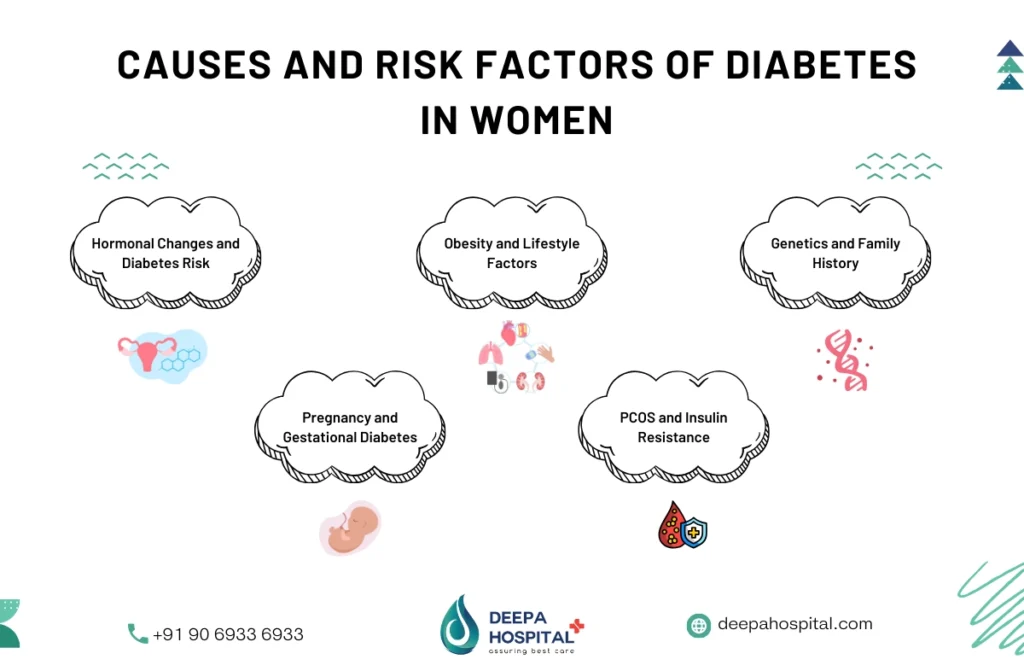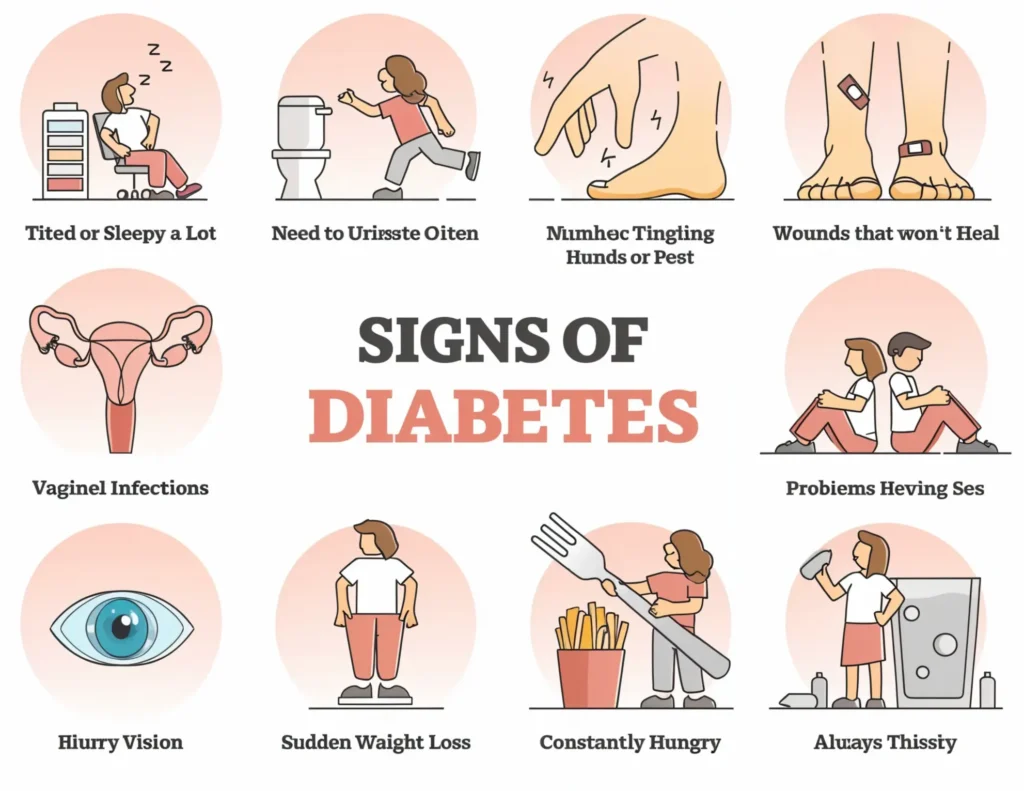Diabetes in Women is a significant health issue that affects millions worldwide. At Deepa Hospitals, we understand the unique challenges women face when managing diabetes. From hormonal fluctuations to pregnancy-related complications, the impact of diabetes in women can vary significantly compared to men. This blog explores the symptoms, early signs, differences in how diabetes affects women, and strategies for effective management.

What is Diabetes?
Diabetes is a chronic medical condition where the body struggles to regulate blood sugar levels effectively. This occurs due to either insufficient insulin production or the body’s inability to utilize insulin properly. Over time, unmanaged blood sugar can lead to severe complications like nerve damage, heart disease, and kidney issues.
The three primary types of diabetes are:
- Type 1 Diabetes: An autoimmune condition often diagnosed in childhood or adolescence, where the immune system attacks insulin-producing cells.
- Type 2 Diabetes: The most common type, often linked to lifestyle factors like poor diet, inactivity, and obesity.
- Gestational Diabetes: A form of diabetes that develops during pregnancy and increases the risk of complications for both mother and baby.
For women, hormonal changes during different life stages such as pregnancy, menopause, and menstruation play a significant role in the development and management of diabetes. Recognizing what are the first signs of diabetes in a woman? can lead to early intervention and better health outcomes.
How Diabetes Affects Women
The way diabetes impacts women differs from how it affects men. Here’s how:
- Pregnancy risks: Diabetes in women increases the risk of pregnancy-related complications, such as gestational diabetes, preeclampsia, and delivering larger-than-average babies.
- Heart health concerns: Women with diabetes have a higher likelihood of developing heart disease compared to men with the same condition.
- Higher infection rates: Women are more prone to frequent urinary tract infections (UTIs) and yeast infections due to high blood sugar levels.
These factors highlight the importance of recognizing early signs of diabetes in women and taking proactive measures to manage the condition effectively.
Symptoms of Diabetes in Women
The symptoms of diabetes can vary depending on the type and stage of the condition. Common symptoms include:
- Frequent urination and increased thirst: The body flushes out excess glucose through urine, leading to dehydration and increased thirst.
- Unexplained fatigue: Persistent tiredness despite adequate rest is a red flag.
- Blurred vision: High sugar levels can cause swelling in the eyes, leading to vision changes.
- Slow healing wounds: Cuts and bruises take longer to heal due to impaired circulation and high glucose levels.
- Frequent infections: Recurring UTIs or yeast infections are common symptoms of diabetes in women.
By paying attention to these symptoms and identifying what are the first signs of diabetes in a woman?, you can take timely action to prevent complications.

Three Ways Diabetes is Different for Women
Diabetes in women comes with unique challenges that differ significantly from men. Here are three ways diabetes is different for women:
- Hormonal fluctuations: Changes during menstruation, pregnancy, and menopause can make managing blood sugar levels more challenging for women.
- Higher risk of heart disease: Women with diabetes are more likely to experience heart complications due to differences in cholesterol and blood vessel health.
- Pregnancy-related complications: Women with diabetes are at a higher risk of developing gestational diabetes, which can affect both the mother and baby.
Understanding these three ways diabetes is different for women is essential for creating effective, personalized treatment plans.
Managing Diabetes in Women
Managing diabetes in women requires a holistic approach that includes lifestyle modifications, medical support, and emotional well-being. Here’s how women can manage diabetes effectively:
- Healthy eating: Focus on a balanced diet rich in whole grains, lean protein, and fresh vegetables. Limit sugar and refined carbs.
- Regular exercise: Physical activities like walking, swimming, or yoga help regulate blood sugar levels and improve insulin sensitivity.
- Medication adherence: Follow your doctor’s recommendations for insulin or oral medications.
- Monitoring blood sugar: Regularly check glucose levels to stay within the target range.
- Stress management: High stress can impact blood sugar levels, so incorporate relaxation techniques like meditation.
Deepa Hospitals offers personalized diabetes management programs tailored to the unique needs of women.
Risk Factors for Diabetes in Women
There are several risk factors for diabetes in women, including genetic, lifestyle, and hormonal influences. Identifying these risks early can help in prevention and management.
Common Risk Factors:
- Family History – A history of diabetes increases the risk.
- Obesity and Sedentary Lifestyle – Excess weight contributes to insulin resistance.
- Polycystic Ovary Syndrome (PCOS) – Women with PCOS have a higher likelihood of developing diabetes.
- Hormonal Imbalances – Estrogen levels affect how insulin functions.
- Unhealthy Diet – High sugar and processed foods contribute to diabetes risk.
- Stress and Poor Sleep – Chronic stress and inadequate sleep can lead to insulin resistance.
Prevention Strategies for Women at Risk
Preventing diabetes involves adopting healthier habits and addressing risk factors early. Here are some tips:
- Maintain a healthy weight: Losing even a small amount of weight can significantly reduce the risk of diabetes.
- Stay active: Engage in at least 30 minutes of moderate exercise daily, like brisk walking or cycling.
- Eat mindfully: Choose fiber-rich foods and avoid processed snacks and sugary drinks.
- Regular screenings: Routine check-ups can detect the early signs of diabetes in women, enabling timely intervention.
Deepa Hospitals emphasizes early detection and prevention strategies to help women reduce their risk of developing diabetes.
Pregnancy and Diabetes in Women
Pregnancy poses unique challenges for women with diabetes. Gestational diabetes, a temporary form of diabetes that occurs during pregnancy, can lead to complications for both mother and baby if left unmanaged.
How Diabetes Affects Pregnancy:
- Gestational Diabetes – Increases the risk of high birth weight and complications during delivery.
- Pre-existing Diabetes – Requires careful blood sugar management to prevent birth defects.
- Hormonal Changes – Insulin resistance may increase, requiring medication adjustments.
- Risk of Preeclampsia – Women with diabetes are at higher risk of high blood pressure.
- Postpartum Effects – Increased chances of developing Type 2 diabetes later in life.
Managing Diabetes During Pregnancy:
- Regular prenatal checkups to monitor blood sugar levels.
- A balanced diet rich in fiber, lean proteins, and healthy fats.
- Safe exercise routines to regulate blood sugar levels.
- Proper medication or insulin management as prescribed by a doctor.
- Frequent blood glucose monitoring to prevent sudden spikes or drops.
What Are the First Signs of Diabetes in a Woman?
These signs are often subtle but can provide critical early clues. Here are some common ones:
- Tingling or numbness: A sensation of tingling in the hands or feet may indicate nerve damage caused by high blood sugar levels.
- Frequent urination: An increase in urination frequency, especially at night, is a common early sign.
- Increased fatigue: Feeling exhausted without a clear reason can point to rising glucose levels.
- Skin issues: Developing dark, velvety patches of skin, especially around the neck, can signal insulin resistance.
- Blurred vision: Sudden changes in eyesight may occur due to fluctuating blood sugar levels.
At Deepa Hospitals, we recommend consulting a healthcare provider if you experience any of these early warning signs.
Symptoms of Type 2 Diabetes in Women
Identifying early symptoms of type 2 diabetes in women is crucial to prevent complications and manage the condition effectively.
- Frequent Urination and Thirst: High blood sugar forces the kidneys to eliminate excess glucose, leading to more urination and constant thirst due to dehydration.
- Fatigue and Unexplained Weight Changes: Inability to use glucose for energy causes extreme tiredness. Some women may also lose or gain weight unexpectedly.
- Recurring Infections: Women may face frequent urinary tract or yeast infections due to high glucose levels creating a favorable environment for microbial growth.
- Skin Changes and Nerve Issues: Darkened skin around the neck or armpits (acanthosis nigricans) and tingling in hands or feet (neuropathy) may signal insulin resistance or nerve damage.
- Blurred Vision and Slow Healing Wounds: Excess sugar affects eye lenses and circulation, causing vision issues and delayed wound healing.
Conclusion
Diabetes in Women is a condition that requires timely recognition, proper management, and proactive prevention. Recognizing symptoms, identifying what are the first signs of diabetes in a woman?, and understanding the unique challenges women face can make a significant difference in managing this condition effectively. At Deepa Hospitals, we are committed to supporting women through personalized care and expert guidance.

